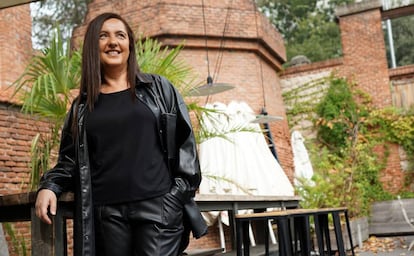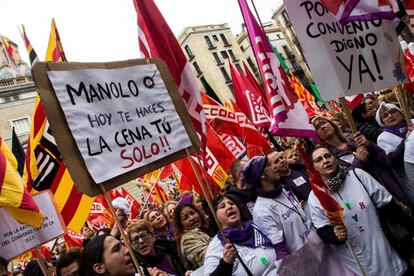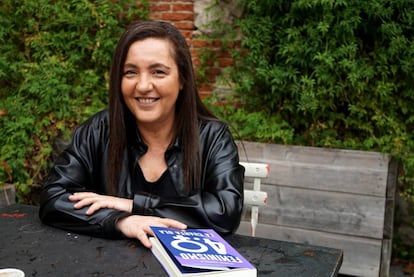“Spanish feminism’s own history makes it ahead of its time”
EL PAÍS talks to author Nuria Varela about the gains made by the women’s movement in Spain, and the fourth generation of feminists who are now leading the fight for greater rights

When Spanish author Nuria Varela wrote her book Feminismo para Principantes (or, Feminism for Beginners), almost nobody was talking about the issue. More than 50,000 copies of the book have been sold since then. And now, 15 years later, amid an unprecedented wave of feminism, Valera has published its follow-up: Feminismo 4.0. La Cuarta Ola (or, Feminism 4.0. The Fourth Wave). “If we don’t tell our story, we lose it. We have to lay down our story, reflect on it and move forward,” she told El PAÍS in an interview at the end of October at Madrid’s Matadero arts center.
The journalist and writer was the first Cabinet director of Spain’s first Equality Ministry, which was created in 2008 under the Socialist Party (PSOE) government of then-Prime Minister José Luis Rodríguez Zapatero. Two months ago, she was appointed the head of the equality department in the Asturian regional government. Varela continues to write, and encourages all of her friends to do the same: “We have a lot of stories that haven’t been told. What women do in general, and feminism especially, are still very hidden.”
Question: You say at the start and the end of the book: “The silence has been broken.” Is that the defining characteristic of this fourth wave of feminism?
Even the very concept of gender violence is questioned
Answer: We have always put a spotlight on what had been in the dark. But millions of women around the world had never before broken their silence like they have with the #MeToo movement and initiatives like #Cuéntalo [or #Tellit, a hashtag women started using to tell their stories of sexual harassment in response to the gang rape case known as La Manada]. We are condemning issues like sexual violence, which we hadn’t talked about, even among ourselves.
Q. But breaking that silence comes at a cost for women.
A. For women, being a feminist and speaking out will always come at a cost. Despite that, millions of women are speaking out in court, in the media, and on social networks. Submission has never helped us. At this point, women should be believed, especially in democratic countries. But women are still not believed. Even the very concept of gender violence is questioned, some people still deny it and the impunity continues.

Q. How relevant are young women in this fourth wave of feminism?
A. Another characteristic of the fourth wave is early awareness. In Spain, we have feminist groups in schools. It’s really good that they have these initiatives so soon. But, I am concerned about one aspect we lack information on. This early awareness has come about because they are suffering from a lot of sexual violence, even in their first relationships. That is a cause for alarm.
Q. Why is this happening?
A. Violence against women continues to happen because we [feminists] have not been able to get into schools. From kindergarten to university, we remain on the fringes, with joint projects but never within the school. The whole of the first chapter of the law against gender-based violence is about education. Things to do with equality seem like a secondary matter. Everyone is against violence, but no one relates it to equality and we cannot end gender-based violence if we don’t work, learn and live in equality.
W cannot end gender-based violence if we don’t work, learn and live in equality
Q. You say that there is no generational renewal in the protests, because nobody has left the movement. Grandmothers and granddaughters all carry the banners.
A. That’s the best thing we have, it’s our biggest contribution. It’s hard to leave feminism. Once you become aware of the issue, and you put on the purple glasses, it is quite hard to take them off.
Q. You consider the International Women's Day on March 8, 2018, as a turning point. How important was the role of the Spanish movement?
A. Spanish feminism wasn’t relevant during the suffragette movement, but in the 21st century it’s very special. It is a lot more political than in the rest of the world. We took just 17 days to hold the first feminist congress after [Spanish dictator Francisco] Franco died. [...] We were faced with a regime that denied the rights of all women. We not only had to research and make speeches, we also had to change customs and society. Spanish feminism has its own history that makes it ahead of its time. But the other characteristic of this wave of feminism is that it’s global: for the first time, there isn’t a corner of the Earth where feminism doesn’t exist, in some form or another.
Q. The march on March 8 2018 put the focus on care-giving duties, which still fall to women.
A. In the politics of equality, we know that nothing is quick [...] but in Spain we move very quickly.

Q. Quickly?
A. Franco was removed from his grave only a week ago [on October 24]. We were the country that gave up on equality and women and look at where we are now. We move very quickly in terms of where we came from, but very slowly in relation to where we want to go. The most important issue that's on the table now is the issue of caregiving because it makes the system unsustainable. The great economists and politicians still don't see the big black hole that is caregiving duties. Women are meant to enter the workforce under the same conditions as men and for no one to provide care. This isn’t sustainable.
Q. Is it important for more women to be in positions of power to change this?
A. The most important thing is for there to be more men at home, not more women in those positions of power. We have left the home but they haven’t entered it. GDP figures in Spain, for example, include prostitution but not childcare. Who decided that?
Q. Soon after US President Donald Trump came to power, there was a women's march, the biggest since the anti-Vietnam War protests in the 1960s and 1970s. The same happened after Brazilian President Jair Bolsonaro was elected. But both are still in power.
There is no democracy without equality
A. We believe that society as a whole is in favor of equality but that is not the case. There are people who believe we have different obligations, rights and roles. The profound discourse of human rights is not internalized by most people. That’s why leaders who go against the discourse of women's emancipation are voted into power. Women care for children. We make money. This old-fashioned and traditional discourse, that is so harmful to women, continues to be normalized among a large part of the population.
Q. The Spanish far-right party Vox is now in government and intends to attack the discourse of feminism. How dangerous is the party to the gains of the women’s movement?
A. Vox isn’t dangerous for feminism, they’re dangerous for democracy. There is no democracy without equality.
Q. You dedicate your book to “girls, teenagers and young women, who, without doubt, will see the fall of patriarchy.” Do you believe that’s true?
A. I really hope so. One of the characteristics of revolutions is that they are always unexpected. I have great confidence in both women and feminism, which has done unimaginable things, although sometimes we let ourselves be discouraged by setbacks. But we have to remember that we came from having no soul, intelligence or conscience. It cost us so much to go to university, enter politics, get to decision-making positions. I trust that young women will do it, I don’t think today’s world is sustainable.
English version by Alicia Kember.
Tu suscripción se está usando en otro dispositivo
¿Quieres añadir otro usuario a tu suscripción?
Si continúas leyendo en este dispositivo, no se podrá leer en el otro.
FlechaTu suscripción se está usando en otro dispositivo y solo puedes acceder a EL PAÍS desde un dispositivo a la vez.
Si quieres compartir tu cuenta, cambia tu suscripción a la modalidad Premium, así podrás añadir otro usuario. Cada uno accederá con su propia cuenta de email, lo que os permitirá personalizar vuestra experiencia en EL PAÍS.
¿Tienes una suscripción de empresa? Accede aquí para contratar más cuentas.
En el caso de no saber quién está usando tu cuenta, te recomendamos cambiar tu contraseña aquí.
Si decides continuar compartiendo tu cuenta, este mensaje se mostrará en tu dispositivo y en el de la otra persona que está usando tu cuenta de forma indefinida, afectando a tu experiencia de lectura. Puedes consultar aquí los términos y condiciones de la suscripción digital.









































